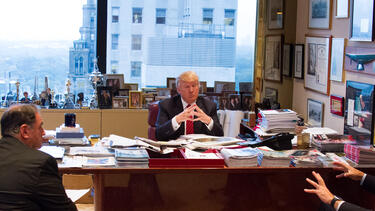Jeffrey A. Sonnenfeld
How DuPont's Directors Failed
CEO Ellen Kullman's departure is one of many examples of dysfunctional corporate boards making rash decisions.
What Can We Learn from Trump?
Leadership scholar Jeffrey Sonnenfeld and political scientist Jacob Hacker, who recently sat down for an hour-long conversation with Donald Trump, discuss their impressions of the man and the current moment in political history.

Why the ‘Dump Trump’ Strategy is Doomed
In a Fortune magazine article, Professor Jeffrey Sonnenfeld suggests that political rivals who underestimate Donald Trump—and the myth surrounding him—do so at their own peril.
How Big Mac Reacts to Attack: Recovering From Missteps
In a Chief Executive magazine commentary, Professor Jeffrey Sonnenfeld applauds McDonald’s for being forthright about recent performance problems at the company and their plan to address them.
Brian Williams Unanchored: A Path to Career Recovery
In a Fortune magazine op-ed, Professor Jeffrey Sonnenfeld says that in order to make a comeback, NBC anchor Brian Williams will need to find a new, public mission.
Women as Bosses Still Face Bias
In a New York Times op-ed, Professors Victoria Brescoll and Jeffrey Sonnenfeld write about the gender bias and discrimination that persist for powerful women in corporate America.
Jeffrey Sonnenfeld on Separating the Chairman and CEO Roles at JPMorgan
In a New York Times op-ed, Senior Associate Dean Jeffrey Sonnenfeld writes about the call to separate the chairman and CEO roles at JPMorgan Chase. “While the model can work on occasion, it is surely no panacea that ensures good economic results or good governance,” he argues.
Putting Trust on Cruise Control at Carnival
Senior Associate Dean Jeffrey Sonnenfeld writes that Carnival CEO Micky Arison is a vivid example of the public’s growing skepticism about leaders.
Are CEOs today's heroes?
All cultures and all eras have their heroes—individuals who set out on a quest and overcome great adversity to attain a glorious end. Jeffrey Sonnenfeld suggests that CEOs today are living out this age-old narrative. He explains why society is looking for its heroes in the corner office.
The chief professional?
With their power, their prominence, and their pay packages, CEOs are cynosures in the business universe. Could the structures of a management profession take in these corporate chiefs? Or should CEOs of publicly traded companies be treated as members of a separate profession, with its own rules and responsibilities?